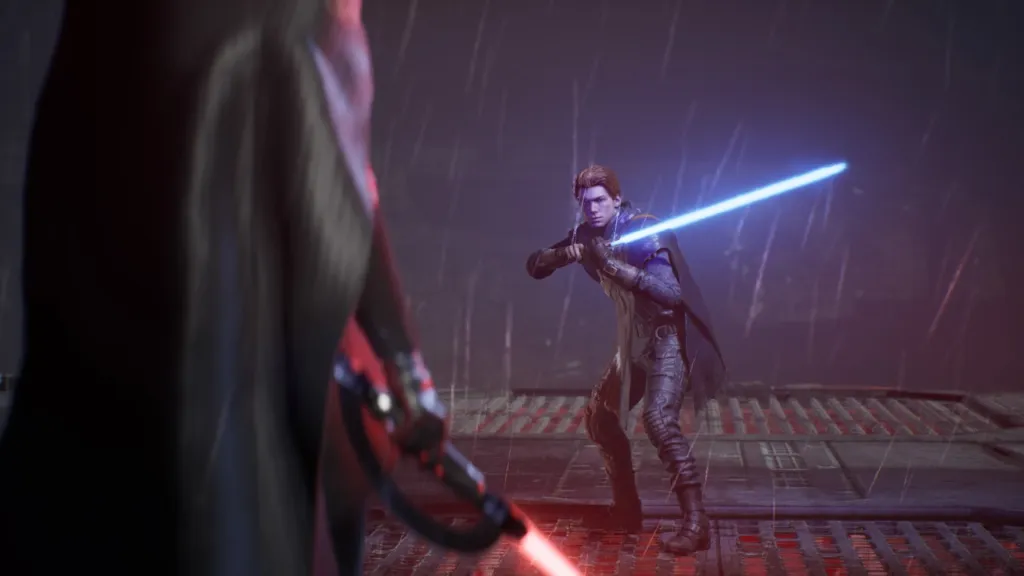There’s been a great disturbance in the Force. It’s as if millions of fans cried out in skeptical fear, then were suddenly silenced. Star Wars Jedi: Fallen Order is finally upon us and it’s ready to stop the jaded masses dead in their tracks. After seemingly eons away from the single-player space, the Star Wars universe is back with vengeance, and this time they’ve brought along some new friends to join in the adventure. Could this finally be the proverbial, “solo experience” droid we’ve been so desperately looking for?
Enforcing Success
Objectively speaking, EA took about a half-decade longer than anticipated to finally cash in on their lucrative licensing agreement with LucasArts. Though they were far from the first internal studio take a bite of the increasingly fickle Star Wars apple, Respawn was the first team to successfully take a narrative-driven experience from inception to completion. As you’d probably expect from a development team with a stellar storytelling lineage that includes the first two Modern Warfare installments, not to mention the criminally underappreciated Titanfall 2 campaign, the narrative elements of Fallen Order are top-notch.
Picking up roughly five years after the execution of the notorious Order 66 (Episode III), the now Jedi-less universe has been thrown into relative chaos. Our primary protagonist, Cal Kestis, is doing his best to lay low and avoid the ever-watchful eye of the increasingly empowered Galactic Empire. In the years since the rather abrupt end of his time as a Padawan, Cal was forced to distance himself from using the Force or run the risk of meeting the same fate as so many other members of the Order.
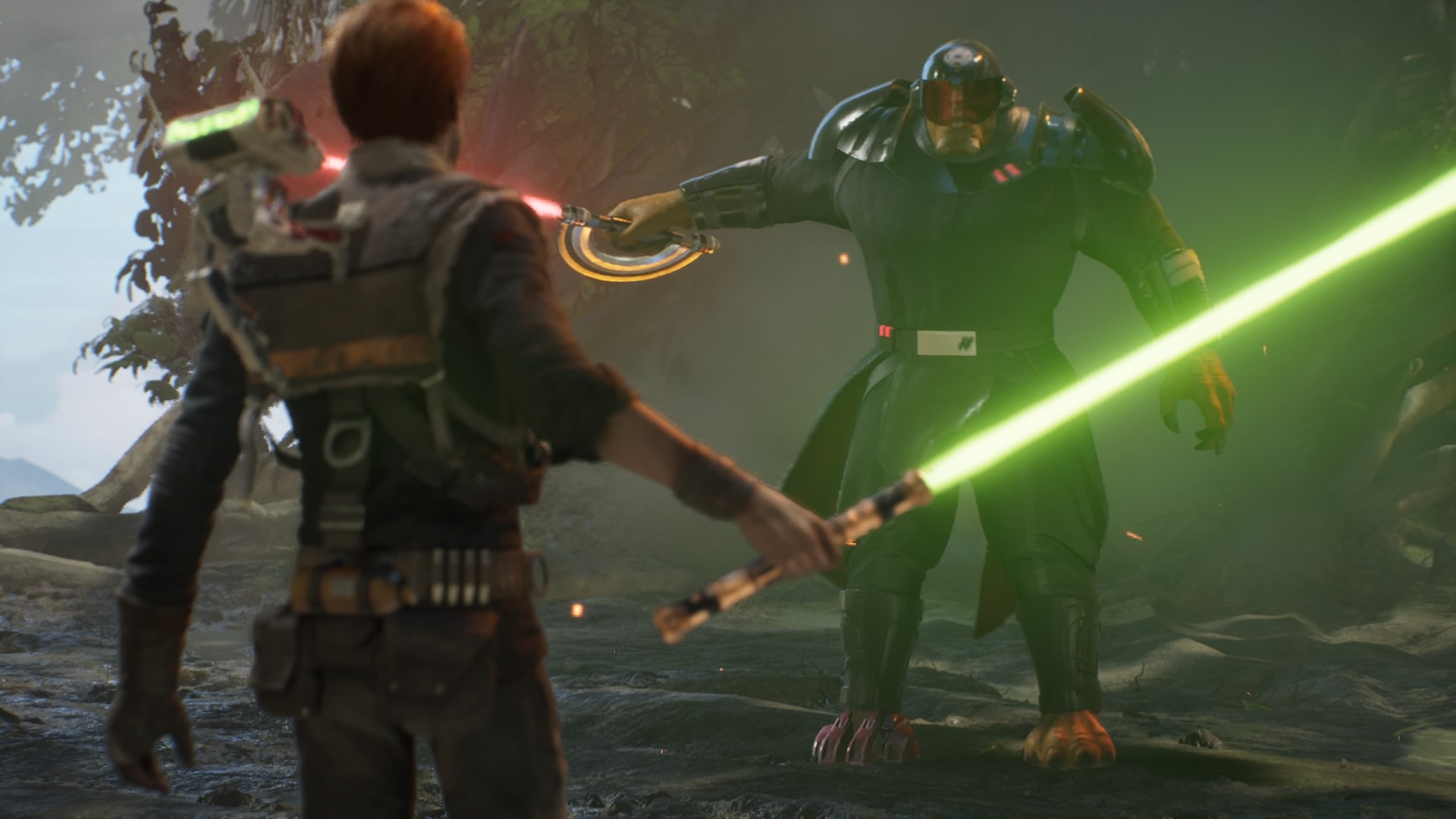
After consciously making the reckless decision to use his abilities in order to save a friend from plummeting to their demise, he once again landed himself in the crosshairs of the dreaded Jedi Inquisitors. While attempting to evade detection, our protagonist finds himself being aided by a couple of Jedi sympathizers that may have a tighter tie to the Order than it would initially appear. Following the direction of the former Knight, Cere Junda, the trio ventures off to retrace the path of her former Master and recover a previously undiscovered Holocron cube containing the names and locations of all known force-sensitive children at the time that Order 66 went into effect.
Shocking as it may be to consider, Fallen Order is actually the first foray into the digital storytelling realm since Disney’s reboot of the Extended Universe canon, post-LucasArts acquisition. It’s extremely evident that the over-arching narrative was shown a painstaking amount of attention, and as such, delivers a very solid extension to the universe that we’ve all grown to know and adore. Despite Cameron Monaghan turning in a perfectly acceptable performance as Cal, his character is admittedly more of a blank slate than most involved in the core story. Debra Wilson delivers far and away the most compelling performance as Cere, though her role clearly was the meatiest as well.
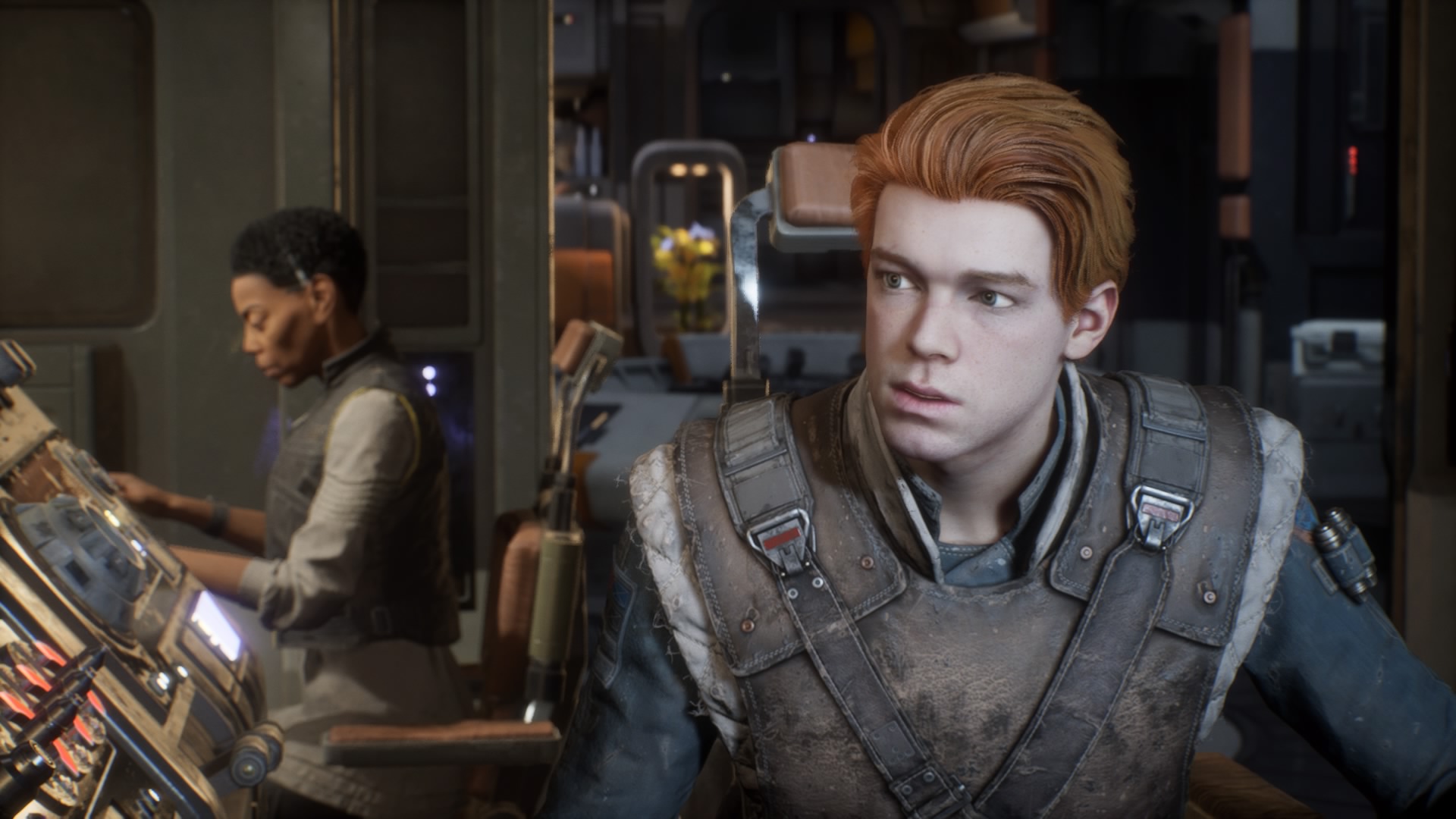
“In a Galaxy Far, Far Away…”
Cal’s adventure takes him across a small sub-section of the Star Wars Universe, spanning a handful of planets, each with their own unique environment types and objectives. A sampling of the cliché neutral, jungle, burned/fire, and snow settings all make an appearance. What I wasn’t expecting, however, was the massive scope and breadth of each locale. Most locations will be revisited more than once, making use of newly unlocked Force Abilities uncovered on other planets, in order to gain access to areas of the map that were previously obstructed. Through this metroidvania-esque approach to exploration, planets that originally appeared to have a relatively modest size, eventually unfurl themselves to reveal massive, sprawling landscapes. Even more impressive was the fact that each celestial rock had its own exclusive vegetation, extremely detailed environmental design, and excessively aggressive native wildlife.
Another avenue for sections of the map to reveal themselves is through gear enhancements to Cal’s ever-present droid companion, BD-1. The splicing, zip-lining, and hacking skills that unlock throughout the campaign become essential to the advancement of exploration. This is also augmented by the use of BD’s holomap, which automatically adds newly discovered locations and further reveals potentially unvisited pathways and locked doors. The constant sensation of discovery felt very reminiscent of an installment in the Uncharted or Tomb Raider franchises. This is driven home even more emphatically by the intricate environmental puzzles that are scattered across each location.
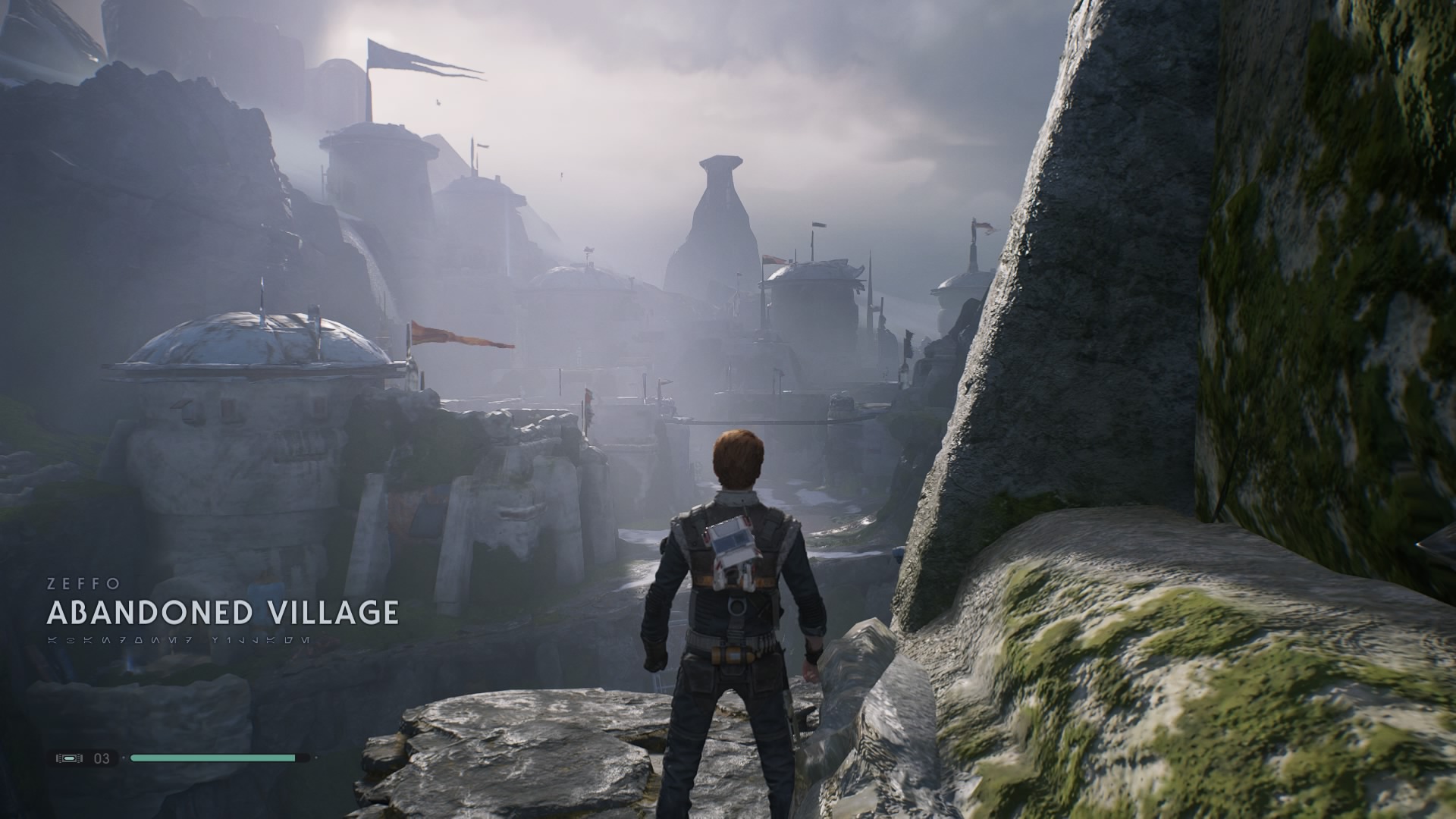
Having maps of this size and scale does come at a bit of a technical cost, however. In the case of my launch PS4, it almost felt like the hardware wasn’t quite stout enough to deliver the uninterrupted experience I was expecting. Shortcomings tended to manifest themselves when transitioning between large chunks of the map all at once. It appears that the environmental data can’t be loaded fast enough to keep up with the speed of the character’s traversal on screen. As a result, there are extended periods where the game would literally pause and become unresponsive to all controller input, while you would visibly see assets pop-in on screen.
Some stages suffer from this issue more than others and even the length of the hangs weren’t consistently predictable. The one consistent aspect of this issue was the fact that it occurred on every single planet. Just to add a bit of insult to injury, there were even numerous times during elevator rides, a mechanic that is rather notoriously used to mask the loading of new map data into memory, where these extended hangs also occurred. Hopefully these immersion-breaking interruptions can be addressed in a future patch, but as of the publishing this review, the only place where it wasn’t an issue was the PC build. (Editor’s Note: These issues were on a standard launch PS4 and may not necessarily be as prominent on other platforms, including the PS4 Pro.)
Striking Back at the Empire
Thankfully these extended loading periods primarily occurred during exploration and never impacted open combat. As a result, the battle mechanics were among the best I’ve experienced all year. Armed with only a lightsaber and his Force abilities, Cal stares down seemingly insurmountable numbers of troops. Only through perfecting and building upon the well-layered attack and parrying systems will players be able to move forward with any level of success. Further complicating matters, when playing on higher difficulty levels, damn near every adversary has the potential of personally introducing you to your maker. Mercifully, the difficulty can be adjusted from the in-game options menu, on-the-fly.
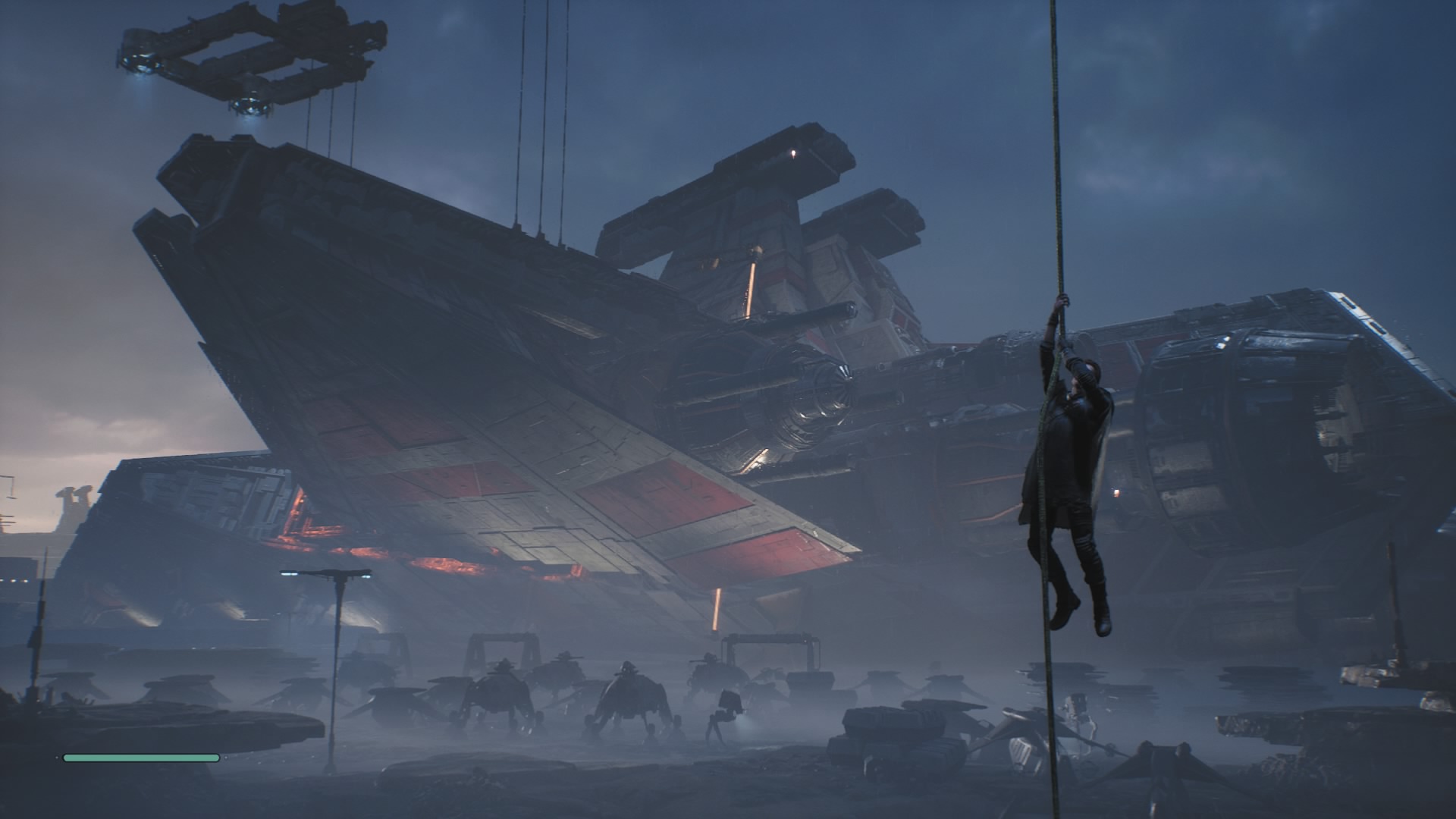
Death isn’t really the end of the road, due to the well-designed checkpointing system. Upon his demise, Cal is zapped back to the last meditation pad he rested at. Each pad also posses as a way to unlock new powers using in-game skill points or a location to refill the health bar. Getting a fresh batch of stimpacks isn’t free though, as it also results in all enemies on the map being respawned. It’s key to weigh these factors, because reanimating enemies may not necessarily affect you in the short term, but given the sheer amount of backtracking inherent to the game’s design, it ultimately will make an impact at some point. Choose wisely, young Padawan.
At its core, Star Wars Jedi: Fallen Order feels like the bastard lovechild of the Uncharted and “Souls” franchises, raised by George Lucas as one of his own. The overall experience could’ve easily stood on its own merits as an entirely new action-packed adventure IP, featuring combat and exploration mechanics that meld together seamlessly. It also goes without saying that existing within the Star Wars canon is absolutely an added benefit, not to mention the consistent through-line that forms the backbone of the narrative. Fortunately, it’s also isolated enough from the rest of the Extended Universe that it’s free of the shackles that would impede a storyline that was more tightly-woven in amongst the canon. Ultimately, this storytelling freedom is what takes an already awesome gameplay experience and elevates it even further. Without question, this is exactly the kickstart that Star Wars has been missing for far too long. There’s no need to consult Yoda, Fallen Order absolutely deserves to appear in your immediate future.
Star Wars Jedi: Fallen Order review code provided by publisher. Reviewed on a standard launch PS4. For more information on scoring, please read our Review Policy.
-
Extremely solid storytelling
-
Well constructed and heavily detailed planet design
-
Stunning setpieces that are begging to be explored
-
Multi-layered combat that evolves over time
-
Stuttering during gameplay to fully load the map
-
Frequent texture pop-in
-
Objectives are occasionally not specific enough
